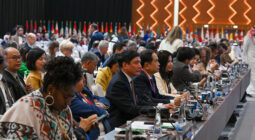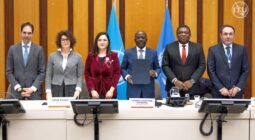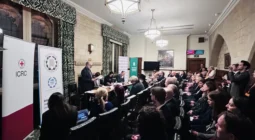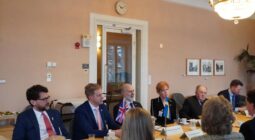

The way forward in Kosovo
Kosovo is a fascinating country. It feels both ancient and brand new. Its people are warm and friendly, and for the most part young and full of life. Enthusiasm and optimism for the future is the dominant characteristic of a people who, despite everything, believe that education, enterprise and hard work will deliver prosperity and success.
Our delegation spent four days in the country, engaging in discussion with parliamentarians, government ministers and representatives from the international community in Pristina. We also visited Peja, Prizren and Mitrovica, meeting politicians along the way at municipal level and representatives from the various faith communities. It was a whirlwind experience which involved us in a visit to the Patriachate at Peja and the monastery at Decan, but which also gave us an opportunity to see for ourselves one of the barricades that divides Mitrovica; it is a concrete symbol of the barriers that stand in the way of Kosovo’s progress to full statehood and comprehensive international acceptance of its status.
Independence for Kosovo was of course declared in 2008, and 85 countries have recognised the new state, but there are a number of ‘non-recognisers’, including crucially Russia, Serbia and five members of the EU. This makes progress towards Kosovo’s aspiration of membership of the EU difficult, to say the least, and the situation is complicated by the territorial claims made even now by Serbia in relation to the area north of the Ibar river in Mitrovica.
Claims relating to criminal networks operating in the disputed territory are rife and the situation is horribly complex, with parallel structures put in place by Serbia effectively undermining Pristina’s attempts to build an effective democracy and implementation of its right to control its borders.
Our discussions explored all of these issues in detail and involved meeting representatives of all political parties from all ethnic groups. We listened to claim and counter-claim, to stories of corruption, organised crime and discrimination. But we also heard about the development of a written constitution, the plans for establishment of independent scrutiny of government spending and procurement and the ongoing work to strengthen democracy by reforming elections to the Assembly and by introducing direct elections for the role of President. We heard about the work of EULEX and other international bodies, dedicated to the everyday work of strengthening the rule of law and encouraging economic and political development. We heard about the ongoing technical dialogue between Kosovo and Serbia, convened and supervised by the European Union.
Everything, however, turns on the issue of the north. Every discussion focuses inevitably on the need to resolve the dispute over a territory which stands as a symbol of Serbian resistance to the existence of Kosovo as a state. Serbia understands that accession to the EU requires good relationships with neighbouring countries and yet it remains resolved to maintain its territorial claims, backed as it is by Russia on this issue. Some argue that a redrawing of the border is the answer, but this of course is resisted by the Kosovan government and indeed the EU itself is opposed to the redrawing of borders as a general principle.
Progress, then, is hard to secure in terms of taking Kosovo forward as a state. But it is not impossible. What became clear to us as a delegation was the need for dialogue, not just with Serbia and the EU, but with the Serbians who actually live in the disputed territory. Kosovo needs to win the minds of these citizens, if not their hearts, by persuading them that their future would be secure as part of this new state. We explored this imperative with politicians from all the parties representing the Albanian majority in Kosovo and were disappointed to receive from some a very hard and dogmatic response; no dialogue with the Serbs of the north was their cry. But in the end, the building of such relationships will ease greatly the resolution of this territorial conflict, and we detected a willingness amongst the more pragmatic representatives of the Albanian majority to do what is necessary to secure progress. What is needed, then, is a degree of political maturity from Kosovo’s emerging democracy, not easy it is acknowledged, but one which understands the need to develop consensus on the key issue of the north rather than using it as a populist means to win electoral support at the expense of competing political parties.
And what about the UK’s role in all of this? Our standing in the country is good; the people of Kosovo appreciate greatly the intervention led by Tony Blair and Bill Clinton, which halted Serbian aggression and attempts at ethnic cleansing. Over a million Kosovans were displaced and sought refuge as a result of the conflict; most have returned. We must not fall into the trap, however, of believing that all is well now and that our work is done. We must remain resolute in our commitment to the status of Kosovo as an independent state and we must use our membership of the EU to ensure that not only does resolution of the outstanding issues remain a high priority but that the Union should continue to use its leverage to secure such a resolution. Serbia has ambitions to join the EU, as does Kosovo; the EU needs to be resolute in its affirmation of the key principles of such membership, particularly with regard to relationships with neighbours, as discussed earlier.
In conclusion, it needs to be acknowledged that Kosovo continues to divide international opinion. Its leadership is recognised by major foreign powers, such as the US, and yet if one trawls the internet one finds that a rigorous propaganda war is being waged in cyberspace against figures like Hashim Thaci. But our visit to the country counter-balanced the virulence of this online assault on Kosovo’s right to exist. We met a people whose values are built around the integrity of the family, the importance of education and the importance of aspiration to the future of their country. We toured a steelworks just re-opened, which it is envisaged will employ approximately 440 people with 300 already on the books. It is on a 20-hectare site and represents the largest service centre for galvanized steel in Europe. Most of the recruitment is from the workforce previously employed at the site and there is an ambition to open up an apprentice training centre.
This is the way forward for Kosovo. Economic investment, political and civic development and the rule of law. The delegation saw something of what Kosovo could be and it is fitting therefore that our driver, as he took us to the airport, told us with great pride of the educational achievements of his children, one of whom is coming soon to the UK as a postgraduate.
He finished our trip for us on a positive note. We must not let him or his people down; we must continue to support Kosovo.













